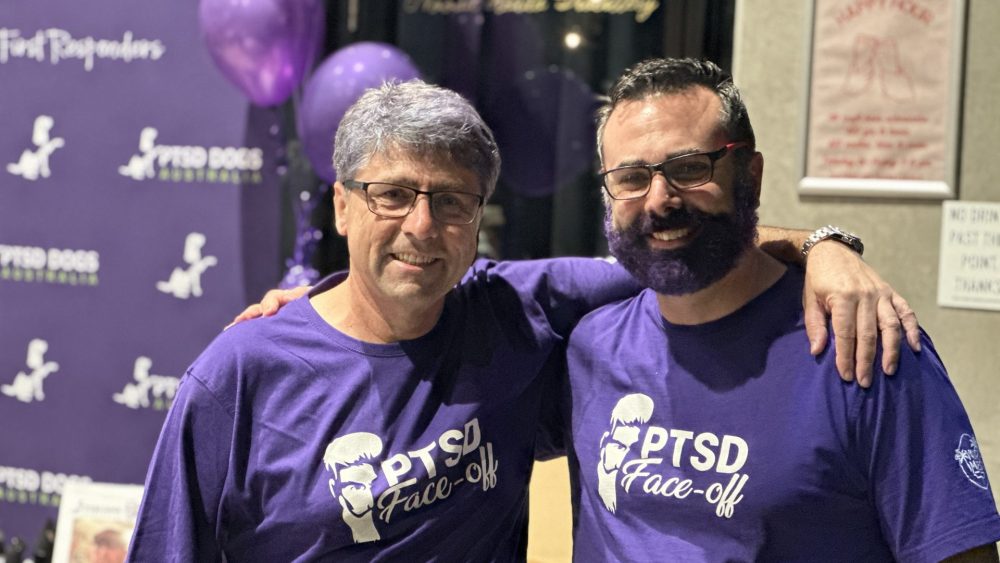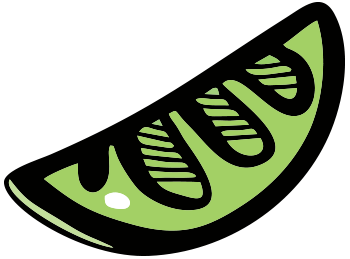Two of the Sunshine Coast’s leading not-for-profit organisations united last night for a special World Mental Health Day fundraiser, raising more than $16,000 to train support dogs to assist Australian Defence Force personnel and first responders living with Post-Traumatic Stress Disorder (PTSD).
In a playful yet heartfelt show of support, a group of 10 courageous participants pledged to dye their hair purple to raise awareness and encourage donations, with some also committing to and shaving their hair if the fundraising target was met.
Thanks to the support of the community, the event raised substantial funds, with every dollar going toward the training and handling of PTSD-certified assistance dogs. Suitable displaced and unwanted dogs are rescued, rehomed, and trained to serve as a lifeline for those suffering from PTSD, offering emotional support, enhancing quality of life and aiding in recovery.
PTSD affects not only veterans and first responders but a wide spectrum of the population. An estimated 75 per cent of Australians have experienced at least one traumatic event, and one in 10 will suffer from PTSD in their lifetime.[1]
Brain & Mind Hub Director and CEO Dr Jim Lagopoulos, who also dyed his hair purple to help raise funds with other team members, highlighted the broader impact of PTSD and the urgent need for continued support and awareness of effective treatments.
“At Brain & Mind Hub, we are deeply committed to helping PTSD and trauma sufferers through neuroscience and evidence-based treatments,” Dr Lagopoulos said.
“Partnering with PTSD Dogs Australia allows us to shine the spotlight on PTSD and the impact of trauma, extending vital support to individuals who need it most, while also cultivating a connected community that prioritises mental health wellbeing. We are proud to help raise awareness and funds for this important cause.
“What many people may not realise is that anyone can experience PTSD – from those affected by natural disasters like floods or bush fires to victims of violence. In our community, the most common events causing PTSD and trauma include the unexpected death of a loved one, being in a car accident or witnessing a death. PTSD doesn’t discriminate, and that’s why it’s so important to raise awareness and support across all sections of our society.”
Dr Lagopoulos says the recently opened Brain & Mind Hub in Maroochydore offers several treatments for PTSD and trauma and is preparing to introduce cutting-edge treatment advances already available elsewhere in the world, right here on the Sunshine Coast.
“Trauma can cause lasting changes in the brain, making PTSD difficult to treat. In fact, more than two-thirds of sufferers do not respond to conventional treatments and therapies commonly used in clinics today[2],” Dr Lagopoulos said.
“However, by focusing on objective measures such as medical testing, brain imaging and physiological evaluations, we can provide more precise diagnoses and personalised treatments tailored to an individual’s brain biology. This innovative approach to PTSD has shown a response rate of 84 per cent, making a real difference in the recovery and adjustment process for those affected.”
Founder and CEO of PTSD Dogs Australia, Angie Weeks, also spoke at the event about the role assistance dogs play in transforming the lives of PTSD sufferers.
“PTSD Dogs Australia plays a crucial role in supporting our large veteran population on the Sunshine Coast, and now, thanks to our new ‘Train Your Own’ program, anyone diagnosed with PTSD,” Ms Weeks said.
“This online program increases accessibility by empowering individuals to train their own dogs as PTSD Assistance Dogs, providing much-needed independence for those who may not otherwise have access to this service.
“These dogs are trained to perform tasks that help alleviate the debilitating symptoms of PTSD. From waking someone during a night terror to creating personal space in crowded environments, and even providing deep pressure therapy by lying across their handler, these dogs offer critical emotional and physical support that helps individuals regain control over their lives.
“Fundraisers like this are vital in ensuring we can continue our work – not just for individuals, but for families and the broader community. Children’s grades improve, family relationships strengthen, and marriages rekindle – helping those with PTSD goes hand-in-hand with bringing families and communities back together.
“We’re incredibly grateful to our volunteers, sponsors, and supporters for their generosity in making this work possible.”
Donations are still open and can be made by visiting: https://www.brainandmindhub.org.au/help-us-raise-money-for-ptsd-dogs-australia/
Brain & Mind Hub Sunshine Coast has a team of specialists and support staff working in the clinic at Level 2, 60 Dalton Drive, Maroochydore. To learn more about Brain & Mind Hub or to book an appointment, go to www.brainandmindhub.org.au
To learn more about Dr Jim Lagopoulos, go to: www.brainandmindhub.org.au/about-us/meet-the-team/dr-jim-lagopoulos
To learn more about PTSD Dogs Australia, go to: www.ptsddogs.org.au.
// Ends.
Media contact: Trudie Abel, Fresh PR & Marketing | 0408 119 443 | trudie@freshprm.com.au
About Brain & Mind Hub
Brain & Mind Hub is the inaugural clinical initiative from Thompson Brain & Mind Healthcare, led by Dr Jim Lagopoulos, one of Australia’s most prominent and respected experts in the field of mental health and neuroscience. The Maroochydore clinic is fast gaining a reputation for its leading approach to mental healthcare with neuroscience-informed and research-centred diagnoses and treatments. With specialists in psychiatry, psychology, neuroscience, and brain imaging technologies all conveniently located under one roof, the clinic offers personalised, holistic programs for mental health disorders to the Sunshine Coast community.
[1] National Study of Mental Health and Wellbeing 2020–2022, AIHW: https://www.aihw.gov.au/reports/mental-health/stress-and-trauma
[2] Phoenix Australia: https://www.phoenixaustralia.org/australian-guidelines-for-ptsd/



